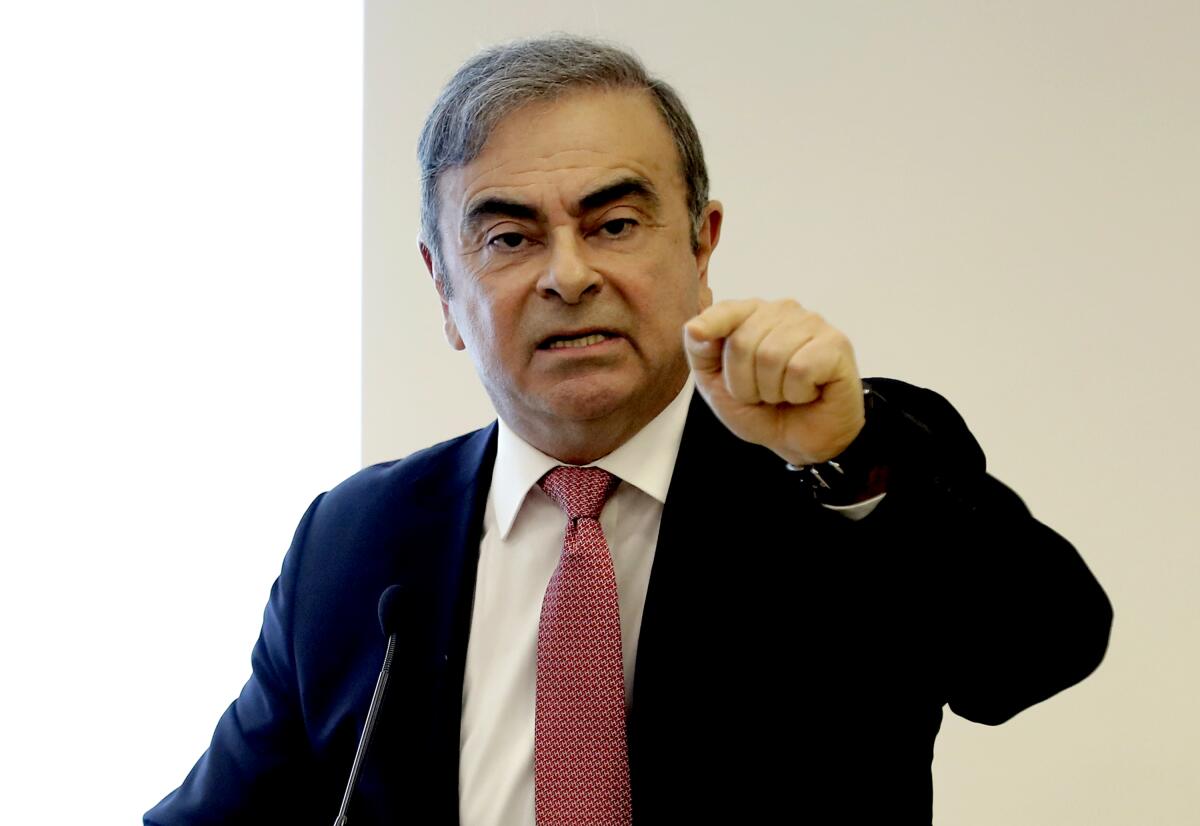Commentary: Carlos Ghosn strikes back, and it’s only going to get worse for Nissan

The Carlos Ghosn circus opened in Lebanon on Wednesday morning, with the ringmaster demanding rapt attention. Some 120 journalists from around the world, armed with cameras and cellphones, crammed in a room to hear Ghosn defend himself for the first time since he escaped from Japan last week.
Ghosn, the former chairman of Nissan Motor Co. — and the creator of the Renault-Nissan-Mitsubishi alliance — spoke nonstop for an hour, his tone emotional, angry, aggrieved, sarcastic, sometimes all at once. Reporters asked Ghosn questions during the ensuing Q&A by shouting over each other.
Obviously, Ghosn’s stunning escape — as you’ve no doubt read, he reportedly hid in a large black box to evade Japanese customs officials at the Osaka airport — was the main reason the world’s business media was in attendance. The Ghosn drama, which began with his surprise arrest in November 2018, has become irresistible. And perhaps just as obviously, it was the one topic Ghosn had no intention of discussing, presumably to protect those who helped him. He made that clear at the start of his news conference.
Carlos Ghosn’s escape started with walking out the front door of his rented house and stepping onto a bullet train.
But the catnip of the escape meant that he was going to have an audience that hung on his every word. Here, finally, was his opportunity to describe what it was like to be a prisoner in Japan — in solitary confinement, with the lights always on, and prosecutors interrogating him eight hours a day for days on end. “It will get worse for you if you don’t confess,” he says they told him. “And if you don’t, we’ll go after your family.”
After he was finally granted bail, he tried to hold a news conference in Japan; the prosecutors responded by filing new charges and tossing him back in jail. He was not allowed to speak to his wife. Important documents he needed for his defense were kept from him. Concluding that there was no possible way he could receive a fair trial in Japan — where, he continually pointed out, the conviction rate is 99.4% — he told himself, “You are going to die in Japan if you don’t get out.”
His fury at the Japanese prosecutors — and the executives at Nissan who he said colluded with them — was palpable. He named those he felt had betrayed him. He mocked Nissan’s performance since he was removed: “I read in Bloomberg that Nissan spent $200 million to get me. How rational is that?” Meanwhile, he added, Nissan’s market cap had fallen by $10 billion; the company had been hurt by spending so much time going after him at the expense of shareholders.
Ghosn accused prosecutors of breaking the law by spreading false information about him to reporters. The news conference was in no small part an act of revenge, and Ghosn made no effort to hide his enjoyment in finally hitting back at Nissan and the prosecutors.
The least effective part of his presentation was his effort to refute the charges that have been brought against him, starting with the allegation that he had underreported some of his compensation. He had internal Nissan documents, signed by various executives and board members, that seemed to show that the company had approved everything he did financially. He projected a handful of them on a wall behind him, but it was hard to fully understand them in the brief time they were up, and in any case this was not the right venue to make a complicated argument. Indeed, if you hadn’t followed the case closely, you were unlikely to understand what he was arguing. (Later, during the Q&A, virtually none of the reporters asked him about the details of his defense.)
I have contended since Ghosn was first arrested that conspiring with prosecutors to have Ghosn arrested was an insane way for Nissan to be rid of him. In most countries, chairmen or chief executive officers are let go by a vote of the board; if they’ve done wrong, the company might try to claw back money or void stock options. L’affaire Ghosn has been an awful distraction for Nissan, which has cost it dearly. With Ghosn now free to defend himself — and to hurl his own allegations at the company — it is only going to get worse. At this point, Nissan couldn’t call a truce even if it wanted to. And it can’t win, either. Nissan has to decide whether it is more interested in pursuing Ghosn or fixing what’s wrong with the company. It has already proved that it can’t do both.
When you get right down to it, Nissan and the Japanese prosecutors put a rich, powerful man — a man unaccustomed to being defied — through hell. Now that he has escaped, it’s his turn to put them through hell. And hell hath no fury like a CEO scorned.
Joe Nocera writes a column for Bloomberg.
More to Read
Inside the business of entertainment
The Wide Shot brings you news, analysis and insights on everything from streaming wars to production — and what it all means for the future.
You may occasionally receive promotional content from the Los Angeles Times.











